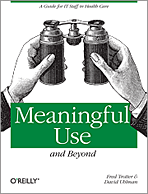Healthcare reform pairs two basic concepts:
- Change incentives: lower costs by paying less for “better” care not “more” care
- Use software to measure whether you are getting “better” care
These issues are deeply connected and mostly worthless independently. This is why all geeks should really care about meaningful use, which is the new regulatory framework from the Office of the National Coordinator of Health Information Technology (or ONC for short) that determines just how doctors will get paid for using electronic health records (EHR).
The clinical people in this country tend to focus on meaningful use incentives as “how do I get paid to install an EHR” rather than seeing it as deeply connected to the whole process of healthcare reform. But any geek can quickly see the bottom line: all of the other healthcare reform efforts are pointless unless we can get the measurement issue right.
Health economists can and do go on and on about whether the “individual mandate” will be effective. Constitutional law experts fret about whether the U.S. federal government should be able to force people to purchase insurance. We are all concerned about issues like the coverage of pre-existing conditions. Hell, I am certainly in the 99%.
Make no mistake, the core problem with healthcare in the United States is that costs are out of control. Under the current system, absent better health information technology, any kind of major system change — like the individual mandate — will simply assure that you get lots more of what you already have. That would be a disaster.
The only way to make healthcare in the U.S. both better and cheaper is to use health information technology. I recently was able to have a whiteboard session with Dr. Farzad Mostashari, and he drew out his view of the whole reform system. It was nice to be able to have such an intimate explanation, but I can think of nothing that he told me that he does not also say in his frequent public appearances (he was awesome at Health 2.0). He talked about this issue as one of “levers.” His point was simple: pulling one lever alone does nothing.
One of the levers on his whiteboard was something called Accountable Care Organizations (ACO), which is term that any technologist who cares about government or healthcare needs to get familiar with. The ACO is a new twist on Capitation. The idea is simple: lets pay doctors for keeping people healthy rather than paying them to treat the sick. But capitation has a bad name in the U.S. because of its abuse by Health Management Organizations (HMOs).
The only differences between an HMO and an ACO are the quality of data systems they will be required to use and the level of detail they will be required to report as a result. You might think of an ACO as the organizational vehicle that healthcare reform will move forward in.
With all of that context, technologists can now intelligently read news regarding the changes in meaningful use requirements for ACOs. For those not wishing to delve further, the news is pretty basic: the rules for ACOs around meaningful use have been made a little easier in the final ACO rule.
The final rule gives more time for ACOs to achieve meaningful use in some cases, and that is generally a good thing. Meaningful use seems simple to technologists, but the real-world rural medical practices and small offices that will need to implement it have very inconsistent computer skills. One of the most important issues for meaningful use is to go at the right speed — and for the most part, that should be as fast as possible … but no faster. Don Berwick (a legend in patient safety circles) explained that the final ACO rule relaxed the meaningful use requirements in response to a “mountain” of comments.
Generally, this is another example of consistently reasonable policy decisions coming from the meaningful use team at ONC. I grew up Republican/Libertarian/Texan and so it seems pretty strange to admit this, but the meaningful use regulations are good government. It is a core component (the geek component) of healthcare reform, and that healthcare reform will be painful. There is just no way around it.
As geeks, we can all call our local congressional representatives and say “this meaningful use thing seems to be going OK.”
I’m pretty sure that’s not a call they get a lot.
 Meaningful Use and Beyond: A Guide for IT Staff in Health Care — Meaningful Use underlies a major federal incentives program for medical offices and hospitals that pays doctors and clinicians to move to electronic health records (EHR). This book is a rosetta stone for the IT implementer who wants to help organizations harness EHR systems.
Meaningful Use and Beyond: A Guide for IT Staff in Health Care — Meaningful Use underlies a major federal incentives program for medical offices and hospitals that pays doctors and clinicians to move to electronic health records (EHR). This book is a rosetta stone for the IT implementer who wants to help organizations harness EHR systems.Related:
